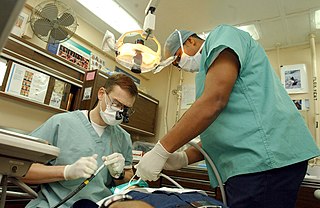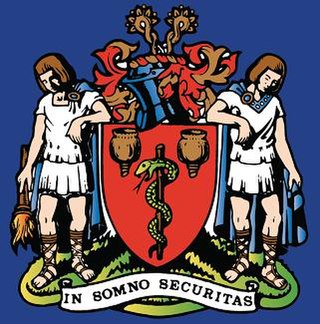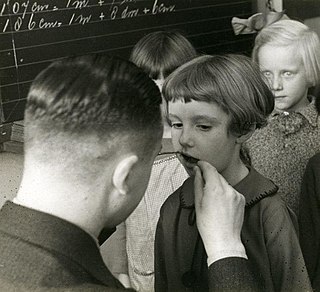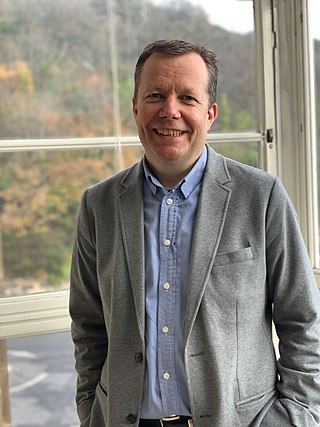
Dentistry, also known as dental medicine and oral medicine, is the branch of medicine focused on the teeth, gums, and mouth. It consists of the study, diagnosis, prevention, management, and treatment of diseases, disorders, and conditions of the mouth, most commonly focused on dentition as well as the oral mucosa. Dentistry may also encompass other aspects of the craniofacial complex including the temporomandibular joint. The practitioner is called a dentist.

A dentist, also known as a dental surgeon, is a health care professional who specializes in dentistry, the branch of medicine focused on the teeth, gums, and mouth. The dentist's supporting team aids in providing oral health services. The dental team includes dental assistants, dental hygienists, dental technicians, and sometimes dental therapists.

General anaesthesia (UK) or general anesthesia (US) is a method of medically inducing loss of consciousness that renders a patient unarousable even with painful stimuli. This effect is achieved by administering either intravenous or inhalational general anaesthetic medications, which often act in combination with an analgesic and neuromuscular blocking agent. Spontaneous ventilation is often inadequate during the procedure and intervention is often necessary to protect the airway. General anaesthesia is generally performed in an operating theater to allow surgical procedures that would otherwise be intolerably painful for a patient, or in an intensive care unit or emergency department to facilitate endotracheal intubation and mechanical ventilation in critically ill patients.

The Association of Anaesthetists, in full the Association of Anaesthetists of Great Britain and Ireland (AAGBI), is a professional association for anaesthetists in the United Kingdom and Ireland.

Geriatric dentistry is the delivery of dental care to older adults involving diagnosis, prevention, management and treatment of problems associated with age related diseases. The mouth is referred to as a mirror of overall health, reinforcing that oral health is an integral part of general health. In the elderly population poor oral health has been considered a risk factor for general health problems. Older adults are more susceptible to oral conditions or diseases due to an increase in chronic conditions and physical/mental disabilities. Thus, the elderly form a distinct group in terms of provision of care.

The University of Birmingham Medical School is one of Britain's largest and oldest medical schools with over 400 medical, 70 pharmacy, 140 biomedical science and 130 nursing students graduating each year. It is based at the University of Birmingham in Edgbaston, Birmingham, United Kingdom. Since 2008, the medical school is a constituent of The College of Medical and Dental Sciences.

Dental assistants are members of the dental team. They support a dental operator in providing more efficient dental treatment. Dental assistants are distinguished from other groups of dental auxiliaries by differing training, roles and patient scopes.
Raman Bedi is Professor of Transcultural Oral Health at King's College London and was the Chief Dental Officer of England from 2002 to 2005. He is Chairman of the Global Child Dental Fund, having established the Global Child Dental Health Taskforce, and continues to practise.
Special needs dentistry, also known as special care dentistry, is a dental specialty that deals with the oral health problems of geriatric patients, patients with intellectual disabilities, and patients with other medical, physical, or psychiatric issues.

Pediatric dentistry is the branch of dentistry dealing with children from birth through adolescence. The specialty of pediatric dentistry is recognized by the American Dental Association, Royal College of Dentists of Canada, and Royal Australasian College of Dental Surgeons.

The UNC Claude A. Adams Jr. and Grace Phillips Adams School of Dentistry is the school of dentistry of the University of North Carolina. It is located in Chapel Hill, North Carolina, United States. It is currently ranked second among all dental schools in the U.S. and is consistently ranked among the best in the world according to two independent rankings. Founded in 1950 as the UNC School of Dentistry, it was the only dental school in North Carolina until 2011, when East Carolina University School of Dental Medicine became the second. In 2019, the school received its largest single donation of $27.68 million, resulting in a name change to honor Dr. Claude A. Adams Jr. and Grace Phillips Adams. Dr. Adams was a North Carolina dentist that practiced in Durham until his death in 2018.
In the United States and Canada, there are twelve recognized dental specialties in which some dentists choose to train and practice, in addition to or instead of general dentistry. In the United Kingdom and Australia, there are thirteen.
Evidence-based dentistry (EBD) is the dental part of the more general movement toward evidence-based medicine and other evidence-based practices. The pervasive access to information on the internet includes different aspects of dentistry for both the dentists and patients. This has created a need to ensure that evidence referenced to are valid, reliable and of good quality.
The American Dental Society of Anesthesiology (ADSA) is an American professional association established in 1953 and based in Chicago.
The European Federation of Periodontology (EFP) is a non-profit organisation dedicated to promoting awareness of periodontal science, the science and clinical practice of periodontics and implant dentistry, and the importance of gum health. Its guiding vision is “Periodontal health for a better life.”
Dentistry provided by the National Health Service in the United Kingdom is supposed to ensure that dental treatment is available to the whole population. Most dentistry is provided by private practitioners, most of whom also provide, on a commercial basis, services which the NHS does not provide, largely cosmetic. Most adult patients have to pay some NHS charges, although these are often significantly cheaper than the cost of private dentistry. The majority of people choose NHS dental care rather than private care: as of 2005, the national average proportion of people opting for private care was 23%. NHS dentistry is not always available and is not managed in the way that other NHS services are managed.

The British Pain Society (BPS) is a multidisciplinary community that brings together a diverse group of clinicians, scientists and those with lived pain experience to improve the knowledge and understanding of pain and its individual and societal impact, contributing to public health policy and clinical practice towards the worthy aim of alleviating pain-related suffering.

Jason Andrew Leitch is the National Clinical Director of the Scottish Government. He is a Senior Clinical Advisor to the Scottish Government and a member of the Health and Social Care Management Board. Leitch provided key leadership throughout the response to the COVID-19 pandemic. He has been praised for his ability to translate complex scientific information to the public, providing calm and clear advice.

Paul Coulthard, BDS, MFGDP(UK), MDS, FDSRCS(Eng), FDSRCS(OS), PhD, FDSRCPS(Glas), FFDTRCS(Ed), FDSRCS(Ed), FCGDent is a British Academic Surgeon and Scientist.












